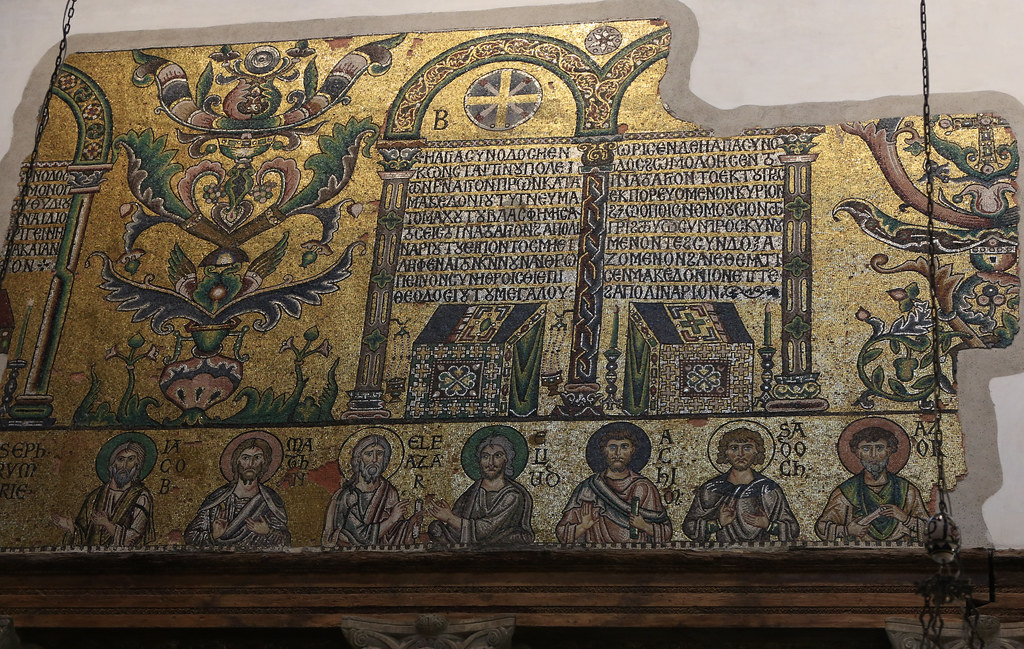Introduction to the Significance of the Number 14 in the Bible
The study of numbers in the Bible offers profound insights into the theological and symbolic significance of numerical patterns. In biblical context, numbers are not merely quantitative figures, but rather convey rich layers of meaning and divine symbolism. The number 14 holds a special place in biblical numerology and symbolism, carrying significant prophetic and messianic connotations, particularly in its connection to Jesus and the gospel. This numerical representation goes beyond mere arithmetic, serving as a powerful symbol that intertwines with the person and mission of Jesus Christ, and the unfolding of God’s redemptive plan [1].
A noteworthy example of the significance of the number 14 can be found in the genealogy of Jesus Christ as recorded in the Gospel of Matthew. The genealogy is meticulously structured into three sets of 14 generations, emphasizing the numerical significance of the number 14 and its connection to deliverance and salvation. This deliberate arrangement not only underscores the messianic promise but also highlights the meticulous design of God’s plan, which culminates in the birth and redemptive work of Jesus Christ. Therefore, the number 14 represents a transitional period, signifying its profound connection to Jesus and the fulfillment of the messianic promise.
Additionally, the number 14 is deeply intertwined with themes of double blessings and serves as a symbol of divine favor and deliverance. The occurrence of the number 14 in genealogies, the stations of the cross, and the Passover feast further accentuates its significance in biblical narratives and its connection to the messianic promise. By understanding the cultural and historical contexts, we can grasp the profound theological implications of the number 14 and its representation of abundant blessings and the fulfillment of God’s promises. Embracing biblical numerology can lead to a deeper understanding of the wisdom encapsulated in the Bible, as the number 14 serves as a symbol of divine blessings, deliverance, and the completion of God’s redemptive plan.
Understanding the Number 14 in Biblical Numerology
The number 14 holds a unique place in biblical numerology, reflecting profound symbolic meanings deeply rooted in the biblical narrative. As a multiple of 7, the number 14 signifies double spiritual perfection, emphasizing a sense of wholeness and divine completeness. This dual perfection not only relates to the messianic promise but also reflects the twofold nature of Jesus’ redemptive work, bringing a sense of spiritual completion and fulfillment to believers.
Furthermore, the number 14 carries significant biblical references, particularly in relation to deliverance and salvation. In the Old Testament, the fourteenth day of the first month is marked by the Passover, signifying God’s deliverance of the firstborn of Israel from death. This association underscores the redemptive nature of the number 14 and its profound connection to the act of deliverance throughout biblical history. Moreover, Nisan 14, a significant date in the Bible, holds deep symbolic meaning as it marks the deliverance of Israel from bondage, foreshadowing the ultimate deliverance of mankind from sin and death through Jesus.
An example of the profound connection between the number 14 and Jesus can be observed in the genealogy of Jesus Christ as presented in the Gospel of Matthew. The intentional division of the genealogy into three sets of 14 generations serves as a testament to the meticulous design and purposeful use of numbers in the Bible, highlighting the profound connection between the number 14 and Jesus’ role in fulfilling the messianic promise. This deliberate structuring of Jesus’ genealogy emphasizes the twofold spiritual perfection represented by the number 14, reinforcing its significance in the unfolding of divine promises and the ultimate redemptive work of Jesus Christ.
#MessianicNumbers13 #Numbers13AndJesus #BiblicalProphecy #PropheticForeshadowing #DivineSymbolism #BiblicalMeaningOfNumbers #NumberSymbolism #BiblicalInterpretation #NumbersInScripture #MessianicProphecy #BiblicalInsights #DivinePromises #NumbersAndTheGospel #PropheticConnections #SymbolicForeshadowing #BiblicalExegesis #NumbersAndTheMessiah #MessianicRevelation #DivineDesign #BiblicalSymbolismExplained
Overview and Context of Numbers 14
The Book of Numbers, situated within the Pentateuch, holds profound significance in biblical history, providing an account of the Israelites’ journey from Mount Sinai to the edge of the Promised Land. Within this context, Numbers 14 emerges as a pivotal chapter that captures a defining moment in the Israelites’ relationship with God. This chapter serves as a backdrop for exploring its prophetic and symbolic connections to Jesus and the gospel, shedding light on the challenges, faithlessness, and divine intervention that culminate in profound connections to Jesus and the gospel.
The narrative in Numbers 14 sets the stage for the Israelites’ journey towards the Promised Land and the challenges they encountered along the way. The Israelites’ response to the report from the spies and their subsequent rebellion against God’s plan were defining moments that shaped their destiny. This context is essential for understanding the significance of Numbers 14 in the broader biblical narrative and its connections to the messianic promise and the gospel. It symbolizes a critical juncture in the Israelites’ journey and reflects the challenges, faithlessness, and divine intervention that culminate in prophetic and symbolic connections to Jesus and the gospel.
An example of the significance of Numbers 14 in relation to Jesus can be found in the events and narratives of the chapter, which serve as a prefiguration of Jesus and his redemptive work. The challenges and divine interventions experienced by the Israelites in Numbers 14 resonate with the broader redemptive narrative of the Bible, pointing to the ultimate deliverance and salvation brought by Jesus Christ. Therefore, the overview and context of Numbers 14 provide a rich backdrop for exploring its profound connections to Jesus and the gospel, emphasizing the prophetic and symbolic elements that find their fulfillment in the person and work of Christ.
Prophetic References in Numbers 14 Connecting to Jesus
The prophetic references in Numbers 14 that connect to Jesus are deeply rooted in the symbolic significance of the number 14. The genealogy of Jesus Christ in the Gospel of Matthew is structured into three sets of 14 generations, emphasizing the numerical significance of the number 14 and its connection to deliverance and salvation. This deliberate structuring not only highlights the messianic promise but also underscores the divine plan of God, which culminates in the birth and redemptive work of Jesus Christ. Each set of 14 generations signifies a pivotal transition in the narrative of God’s redemptive plan, ultimately leading to the fulfillment of the messianic promise.
Moreover, the genealogy of Jesus in Matthew portrays him as the Son of David, further reinforcing the prophetic references in Numbers 14 and symbolizing the unwavering movement of God’s plan towards completion. This connection to the lineage of David accentuates the messianic significance of Jesus and his role as the long-awaited deliverer. It serves as a testament to the meticulous design of God’s plan, which unfolds across generations and finds its ultimate fulfillment in the person of Jesus Christ. Therefore, the prophetic references in Numbers 14 not only point to the anticipation of the Messiah but also affirm the divine orchestration of history leading to the redemptive work of Jesus.
In addition to the genealogy of Jesus, the events and narratives in Numbers 14 serve as a prefiguration of Jesus and his redemptive work. The challenges and divine interventions experienced by the Israelites in Numbers 14 resonate with the broader redemptive narrative of the Bible, pointing to the ultimate deliverance and salvation brought by Jesus Christ. Therefore, the prophetic references in Numbers 14 provide a rich tapestry of connections to Jesus, emphasizing the profound foreshadowing of the messianic promise and the redemptive work of Christ.
Symbolic Elements in Numbers 14 Foreshadowing Jesus
The symbolic elements in Numbers 14 play a significant role in foreshadowing Jesus and his redemptive work. The pillar of cloud and fire, which guided the Israelites through the wilderness, symbolizes Jesus as the light of the world. This symbolic imagery not only reflects the physical presence of God among his people but also points to Jesus’ spiritual guidance and illumination in the lives of believers.
Moreover, Aaron the High Priest in Numbers 14 represents Jesus as our great High Priest, who intercedes for humanity and offers atonement for sin. The role of the High Priest in the Old Testament serves as a foreshadowing of Jesus’ ultimate sacrifice and mediation for the sins of the world, emphasizing the continuity and fulfillment of God’s redemptive plan through Christ.
Furthermore, Balaam’s prophecy in Numbers 14 anticipates the coming deliverer, which finds its fulfillment in Jesus Christ. Balaam’s words echo the promise of a future Messiah who will bring salvation and deliverance to God’s people, pointing to Jesus as the ultimate fulfillment of this prophetic declaration. The symbolic elements in Numbers 14 not only provide a rich typology of Jesus but also underscore the interconnectedness of the Old Testament narratives with the person and work of Christ.
The water of separation in Numbers 14 parallels the cleansing of sin by Jesus, reinforcing the symbolic elements that foreshadow Jesus in Numbers 14. This symbolic connection underscores the redemptive work of Jesus and the profound spiritual significance of the symbols in Numbers 14, pointing to his role as the promised Messiah and the Savior of the world. Therefore, the symbolic elements in Numbers 14 serve as rich and meaningful foreshadowings of Jesus and his redemptive mission, inviting believers to delve deeper into the profound symbolism and spiritual truths encapsulated in these symbols.
Messianic Significance of Numbers 14 in Relation to Jesus
The messianic significance of Numbers 14 in relation to Jesus is deeply rooted in the prophetic and symbolic elements found in the Old Testament narrative. One of the most compelling connections is the foreshadowing of Jesus as the Messiah through the events and symbols in Numbers 14. For instance, the bronze snake in Numbers 21 serves as a profound symbol that points to the sacrificial role of Jesus on the cross. This symbolic parallel between the bronze snake and the redemptive work of Jesus signifies the messianic significance of Numbers 14 in relation to Jesus. The act of looking at the bronze snake for physical healing draws a striking resemblance to the spiritual healing and salvation brought forth by Jesus’ sacrifice on the cross, underscoring the messianic fulfillment of Numbers 14 in the person of Jesus.
Moreover, the narrative in Numbers 14 also sets the stage for the messianic promise and the deliverance of mankind from sin and death through Jesus. The events and symbols in Numbers 14 serve as a precursor to the ultimate deliverance and salvation that would be fulfilled through Jesus Christ. This connection highlights the profound messianic significance of Numbers 14, emphasizing its role in pointing to the redemptive work and the fulfillment of God’s promises through Jesus. Therefore, Numbers 14 stands as a testament to the intricate and intentional foreshadowing of Jesus as the Messiah, reinforcing the messianic significance of this biblical passage in relation to Jesus and the gospel.
In addition to the symbolic elements, the narrative in Numbers 14 provides a profound foreshadowing of Jesus as the fulfillment of the messianic promise. The challenges and divine interventions experienced by the Israelites in Numbers 14 resonate with the broader redemptive narrative of the Bible, pointing to the ultimate deliverance and salvation brought by Jesus Christ. Therefore, the messianic significance of Numbers 14 in relation to Jesus underscores the profound connections between the Old Testament narratives and the redemptive work of Christ, highlighting the intentional foreshadowing of Jesus as the promised Messiah.
Gospel Connection to the Events in Numbers 14
The gospel connection to the events in Numbers 14 is profound and multifaceted. The narrative in Numbers 14 resonates with the core message of the gospel, emphasizing the themes of deliverance, salvation, and the fulfillment of God’s promises through Jesus’ sacrifice. For instance, the Israelites’ deliverance from bondage in Numbers 14 mirrors the deliverance of mankind from sin and death through Jesus, highlighting the redemptive nature of Jesus’ ultimate sacrifice on the cross.
Moreover, Nisan 14 holds significant biblical importance, particularly in relation to the gospel. This date marks the deliverance of Israel from bondage, serving as a powerful foreshadowing of the ultimate deliverance of humanity from the enslavement of sin and death through Jesus Christ. The parallel between the Old Testament narrative in Numbers 14 and the gospel message underscores the divine orchestration of God’s redemptive plan throughout history, culminating in the sacrificial act of Jesus on the cross. This profound connection reflects the continuity of God’s redemptive plan, wherein the events of Numbers 14 find their ultimate fulfillment in the death and resurrection of Jesus, offering eternal deliverance and salvation to all who believe.
The gospel connection to Numbers 14 not only highlights the historical significance of the Israelites’ deliverance but also underscores the profound spiritual implications of Jesus’ redemptive work. It serves as a compelling testament to the continuity of God’s redemptive plan, wherein the events of Numbers 14 find their ultimate fulfillment in the death and resurrection of Jesus, offering eternal deliverance and salvation to all who believe.
Biblical Significance of the Number 14 in Relation to Jesus
The biblical significance of the number 14 in relation to Jesus is deeply rooted in the genealogy of Jesus as presented in the Gospel of Matthew. This genealogy is divided into three sets of 14 generations, symbolizing double spiritual perfection and emphasizing the divine completeness and fulfillment represented by the number 14. Furthermore, the intentional structuring of the genealogy to highlight the number 14 underscores the meticulous orchestration of God’s plan throughout history, culminating in the birth of Jesus Christ.
An example of this numerical significance can be observed in the genealogy’s presentation of Jesus as the fulfillment of the messianic promise. By carefully crafting the genealogy to consist of 14 generations in each set, the Gospel of Matthew not only underscores the symbolic meaning of the number 14 but also emphasizes Jesus as the long-awaited Messiah. This deliberate numerical pattern serves as a testament to the divine plan unfolding over the course of history, leading to the ultimate manifestation of God’s promise in the person of Jesus Christ, the Savior of the world.
The number 14 in the genealogy of Jesus also serves as a powerful reminder of the continuity and unwavering movement of God’s redemptive plan. Each set of 14 generations represents a distinct phase in the unfolding narrative of God’s salvation history, illustrating the progression towards the ultimate manifestation of God’s grace and salvation in Jesus. Therefore, the biblical significance of the number 14 in relation to Jesus not only highlights the fulfillment of the messianic promise but also reinforces the completeness and unwavering movement of God’s plan towards redemption and salvation.
The Symbolic Connections Between the Signs in the Book of Numbers and Jesus
The Book of Numbers contains powerful signs from God that serve as symbolic connections to Jesus and his role in the deliverance and salvation of mankind. One of the most striking examples is the bronze snake in Numbers 21, which remarkably foreshadows the cross of Christ and his ultimate sacrifice for the world. This connection is deeply symbolic, as Jesus himself identified with the bronze snake as a prediction of his death to save humanity, emphasizing the profound significance of this sign in relation to the gospel.
Furthermore, the water of separation in Numbers symbolically parallels the cleansing of sin by Jesus, highlighting the deeper symbolic connections between the signs in the Book of Numbers and their ultimate fulfillment in Jesus. This symbolic connection underscores the redemptive work of Jesus and the profound spiritual significance of the signs in the Book of Numbers, pointing to his role as the promised Messiah and the Savior of the world. Therefore, the signs in the Book of Numbers serve as rich and meaningful foreshadowings of Jesus and his redemptive mission, inviting believers to delve deeper into the profound symbolism and spiritual truths encapsulated in these signs.
An additional example of the profound connection between the signs in the Book of Numbers and Jesus can be found in the pillar of cloud and fire, which guided the Israelites through the wilderness. This symbolizes Jesus as the light of the world, providing guidance and direction to those who follow him. This symbolic imagery not only reflects the physical presence of God among his people but also points to Jesus’ spiritual guidance and illumination in the lives of believers. Therefore, the symbolic connections between the signs in the Book of Numbers and their fulfillment in Jesus provide a rich tapestry of typology and symbolism that underscores the profound connection between the Old Testament narratives and the redemptive work of Christ.
The Foreshadowing of the Cross of Christ in Numbers 21
In Numbers 21, we encounter a powerful and prophetic symbol that foreshadows the redemptive work of Jesus Christ on the cross. When the Israelites were afflicted by venomous snakes as a result of their sin, God instructed Moses to make a bronze serpent and put it on a pole. Those who were bitten and looked at the bronze serpent would live. This incident serves as a profound prefiguration of Jesus’ crucifixion and the salvation he would bring to the world.
The bronze snake in Numbers 21 becomes a striking symbol of Jesus’ sacrificial death on the cross. Just as the afflicted Israelites were healed by looking at the bronze serpent, humanity finds healing and redemption by turning to Jesus Christ and believing in his atoning sacrifice on the cross. This symbolic connection underscores the profound significance of the events in Numbers 21 as they point to the future redemptive work of Christ, bringing healing and forgiveness to all who believe in him.
Furthermore, the bronze snake in Numbers 21 serves as a profound symbol of Jesus’ sacrificial death on the cross. Just as the afflicted Israelites were healed by looking at the bronze serpent, humanity finds healing and redemption by turning to Jesus Christ and believing in his atoning sacrifice on the cross. This symbolic connection underscores the profound significance of the events in Numbers 21 as they point to the future redemptive work of Christ, bringing healing and forgiveness to all who believe in him. Therefore, the events in Numbers 21 provide a rich and profound foreshadowing of the cross of Christ, emphasizing the redemptive work and the sacrificial role of Jesus in bringing healing and salvation to the world.



